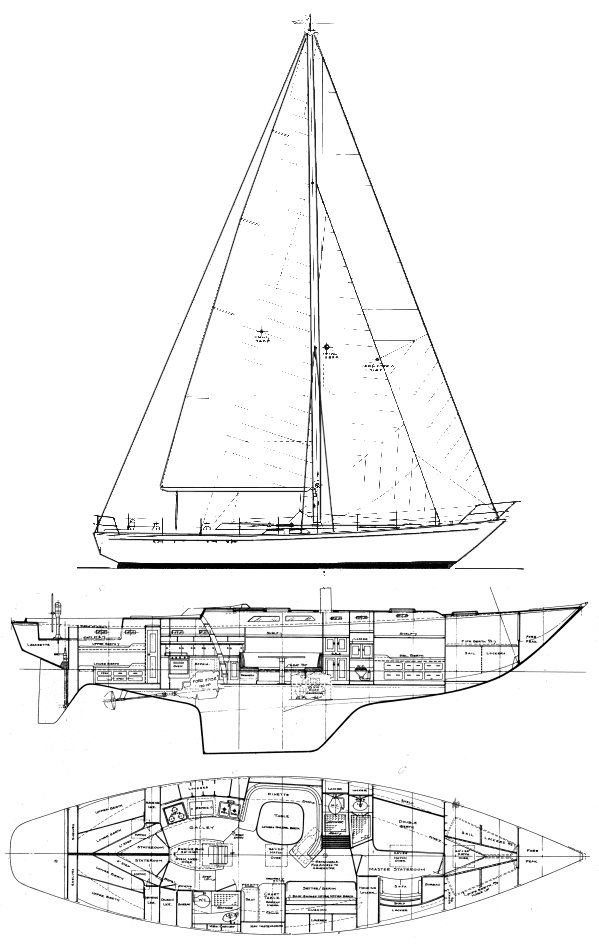The Cheoy Lee Wittholz 53 is a substantial cruising sailboat, embodying the robust construction and offshore capability for which its builder, Cheoy Lee Shipyard, is renowned. Designed by the esteemed naval architect Charles Wittholz, this vessel was conceived to offer a comfortable and capable platform for serious cruising enthusiasts. It stands as a testament to Cheoy Lee's enduring legacy in producing high-quality fiberglass yachts.
Wittholz 53 (Cheoy Lee) Information, Review, Specs

- Make
- Cheoy Lee
- Model
- Wittholz 53
- Number Built
- Production Year(s)
- 1977 - ??
The production of the Cheoy Lee Wittholz 53 began in 1977. Commissioned by Cheoy Lee Shipyard, Charles Wittholz, a well-known naval architect, brought his expertise to the design of this 53-foot vessel. During this era, Cheoy Lee was at the forefront of marine construction, pioneering the extensive use of fiberglass and GRP (Glass Reinforced Plastic) with foam sandwich technology, celebrated for its benefits in weight savings, strength, and longevity. This approach contributed to the Wittholz 53's solid and durable construction. While specific design philosophies for this model are not extensively detailed in public records, it aligns with Cheoy Lee's broader reputation for delivering dependable and globally capable vessels. Information regarding significant variations or different marks during its production run is not readily available.
Sailing Performance and Handling
The Cheoy Lee Wittholz 53 is configured with a cutter rig, a versatile sail plan known for offering flexibility in managing sail area across a wide range of wind conditions. With a sail area to displacement ratio (SA/D) of approximately 16.6, the Wittholz 53 is characterized as a moderate performance cruiser. This ratio suggests a balanced approach, providing respectable performance without being overly sensitive to light air, making it suitable for comfortable passage making rather than high-speed racing.
Further insights into its stability and motion come from its ballast to displacement ratio (B/D) of around 0.41, which is considered high. This substantial ballast relative to its displacement indicates a very stiff and stable vessel, capable of standing up to significant wind and carrying its canvas effectively without excessive heel. This characteristic is highly desirable for offshore cruising, ensuring a more comfortable and secure ride in challenging conditions.
The displacement to length ratio (D/L) of approximately 283.4 firmly places the Wittholz 53 in the medium to heavy displacement cruiser category. This heavier displacement typically translates to a smoother motion in a seaway, greater load-carrying capacity, and a generally more comfortable ride, albeit at the expense of outright speed. Her fin keel with a skeg-hung rudder further contributes to a good balance of directional stability and maneuverability, allowing for reliable tracking on a course and robust steering control.
Accommodations and Layout
While specific detailed interior layouts for the Cheoy Lee Wittholz 53 are not widely published, its substantial length overall of 53 feet and a generous beam of 14.5 feet suggest a voluminous interior. Given Cheoy Lee's reputation for quality craftsmanship and robust construction, typical interiors of their vessels from this era would feature durable materials, often including extensive use of wood trim and robust fiberglass components. Owners can generally expect well-appointed living spaces conducive to extended cruising. The large dimensions would accommodate multiple cabins, a spacious salon, a functional galley, and adequate head facilities, providing comfortable living arrangements for several people on board. Storage capacity would likely be generous, a critical feature for long-distance cruising. Due to limited specific information on this model's interior, prospective owners should seek detailed reviews or inspect individual vessels for precise layout and finish quality.
Measurements
Construction & Hull
- Construction Material
- Fiberglass (Foam Core)
- Hull Type
- Monohull Sailboat
- Keel Type
- Fin
- Rudder
- 1x Skeg-Hung
- Ballast
- 18000 lbs
- Displacement
- 43758 lbs
- Water Capacity
- 300 gal
- Fuel Capacity
- 200 gal
Engine
- Engine Make
- Perkins
- Engine Model
- —
- Engine Type
- —
- Engine HP
- 85
- Engine Count
- 1
- Drive Type
- —
- Fuel Type
- Diesel
Rig & Sails
- Rig Type
- Cutter
- P (Main Luff)
- 57.5 ft
- E (Main Foot)
- 19.8 ft
- I (Foretriangle Height)
- 63 ft
- J (Foretriangle Base)
- 22.7 ft
- Forestay Length (est)
- 66.96 ft
- Main Sail Area
- 569.25 sqft
- Foretriangle Sail Area
- 715.05 sqft
- Total Sail Area (Reported)
- 1284 sqft
- Total Sail Area (Calc)
- 1284.3 sqft
Dimensions
- LOA
- 53 ft
- LWL
- 41 ft
- Beam
- 14.5 ft
- Draft
- 7.78 ft
- Max Headroom
- -
- Air Draft
- -
Calculations
- Hull Speed
- 8.58 kn
- Pounds per Inch Immersion
- 2